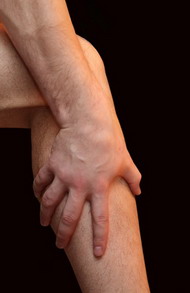Women Healthy -

Leg cramps is a very disturbing and certainly painless, can occur at any time, either in the middle of exercise, in the middle of the night and so on. Cramps usually last less than a minute, but it could be more than 15 minutes.

Causes of leg cramps
Cramps can be caused by many things, such as:
- The muscle fatigue
- The use of excessive muscle
- Lack of body electrolytes (Ca and K) due out through sweat
- The buildup of lactic acid (products of metabolism in the muscle)
- Disruption of muscle tissue oxygenation
- Disruption of blood circulation to the tissues
Tips To Get Rid Of Leg Cramps
Here are the steps that can be taken to get rid of leg cramps:
1. Avoid high heels
Although loose size, shape of high heels cause your finger is always bent so that blood flow is not smooth.
2. Choose shoes that are loose
Shoes that are too tight in the end make your toes often experience stress when walking, especially when standing on tiptoe. As a result, blood flow at the site of substandard so easy finger cramps.
3. Keep balance of body fluids
Lack of body fluids is also a risk factor for the occurrence of muscle cramps, including the toes. Drink plenty of water, especially during heavy exercise and a lot of sweat.
4. Inadequate mineral the body needs
One trigger cramps in the toes is a shortage of minerals, especially calcium, potassium and magnesium. The recommended minimum intake is 1,000 mg of calcium and 4.7 grams of potassium per day. Special magnesium, recommendation is 400-420 mg per day for men and 310-320 mg for women.
5. Move your toes
Do not need special equipment to train flexibility and power of the toes. Simply by moving it to take a towel or marbles on the floorwhile standing for example, or move it as you please while sitting relaxed
6. Massage or soak in warm water
Many ways to improve blood circulation in the legs, but the easiest and most convenient thing to do is often massaged. Another fun way is frequently warm bath. Warm bath before bed. This will relax the muscles in the legs and reduce the possibility of cramps.
7. Regular exercise
Stretching legs regularly during the day will make the muscles relax and prevent cramps. If leg cramps occur at night, gently stretch your legs. This will help stimulate blood flow in the legs.
8. Increase your intake of potassium and calcium
Both minerals are important to help the process fluid in the body. Eat foods rich in potassium, such as bananas, poultry, and fish. Fill calcium by consuming low-fat yogurt or fat-free milk.
9. Wear proper footwear with soles that support your body properly. Footwear or high heels should be avoided.
10. Use a thick blanket
Thick blanket can put pressure on the foot. In cold air, wear socks so that warmer.









